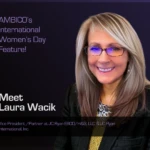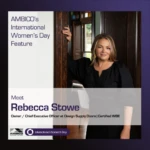Kera Drabick’s Journey of Mentorship, Leadership, and Driving Change in the Construction Industry

Kera Drabick – Director of Government Services at The Cook & Boardman Group
Kera Drabick’s career is built on mentorship, leadership, and the courage to spark change. As a mother, veteran, ally, and industry leader in construction, she has built a career defined by resilience, advocacy, and a commitment to inclusion. She believes that while mentorship is vital in shaping young professionals, real transformation requires collective action to foster equity and inclusion.
As Director of Government Services at The Cook & Boardman Group, Kera leads strategic initiatives and operational direction within the Federal Government vertical. More than just driving business success, she is actively working to reshape the industry into a more inclusive space. Recognizing the need for support networks, in 2024, she founded the Women’s Business Resource Group, offering mentorship, sponsorship, and professional development opportunities for women in construction.
From Hospitality to Construction: A Bold Career Shift
Kera’s path to construction wasn’t conventional. After completing her military service, Kera began her career managing large-scale events in the hospitality sector. As her children grew older, she sought a career that aligned with her evolving priorities. That change came through a conversation with Robin Snyder, a long-time family friend and industry veteran, who saw Kera’s potential. Despite being five months pregnant, Kera took the leap into a completely new industry—determined to learn, grow, and succeed.
As Kera entered the world of doors and hardware, she was fortunate to have the guidance of strong mentors. Robin Snyder, then a Business Development Consultant at Cook & Boardman, played a pivotal role in transitioning Kera into the industry, helping her gain industry-specific expertise and navigate its complexities. Later, when Robin left, Keith Rabush took over her role as Branch Manager and continued to support and mentor Kera as she advanced in her career. Their support, along with Kera’s unwavering determination, helped her grow into a respected leader in the industry. Now, eighteen years in, she is a key figure at The Cook & Boardman Group, where she is transforming brands, optimizing business strategy, and driving long-term growth.
Challenging Bias and Leading with Awareness
Being a woman in construction has its unique challenges, many of which often stem from a lack of familiarity. When Kera first joined the industry, there were very few women in the industry, and many of the men she worked with had rarely had to navigate professional relationships with women within a work setting. This unfamiliarity often resulted in unconscious biases—small moments that, while unintentional, reflected deeper systemic patterns.
One such moment occurred after a meeting when a client shook hands with her male colleague, Keith Rabush, but overlooked Kera. It may not have been intentional, but it still created an uncomfortable moment. Kera initially felt a mix of surprise and confusion—why, despite being an integral part of the conversation, was she not extended the same professional courtesy? Was it an oversight, or something more ingrained? Rather than letting uncertainty turn into frustration, she chose to seek understanding.
She later spoke with Keith, asking if he had noticed the interaction. To her surprise, he responded, “Yes, I did notice, but I didn’t think you did” This conversation opened the door to a broader discussion about different perspectives and unconscious biases in professional settings.
At the end of their discussion, Kera and Keith reflected on how he, as a leader, could be more intentional in fostering inclusivity in similar situations. They explored subtle but effective strategies, such as using body language or gestures to naturally prompt a handshake with Kera or any female colleague. They also considered the importance of intentional follow-ups, such as reinforcing a colleague’s contributions in conversation or subtly reintroducing overlooked individuals, to ensure women in the room receive the same professional acknowledgment.
“Creating inclusivity starts with having the uncomfortable conversations,” Kera says. ” Keith and I have had many, many, many uncomfortable conversations.” These discussions have played a vital role in strengthening awareness and making their company a more inclusive place.
Balancing Motherhood and Leadership
Beyond workplace interactions, another challenge women often face is balancing career and family. Early in her career, Kera was told outright that she couldn’t have both a successful career and a fulfilling family life. But she refused that notion, proving that professional success and personal fulfillment can coexist.
When it comes to balancing motherhood and career, ‘There’s no real balance. It’s all about threading the line, making intentional decisions, and sticking to them,’ Kera shares. ‘That’s what keeps me in a happy place, feeling successful, and ensuring my family remains a priority.’ And it can be done.
For Kera, building an inclusive workplace means challenging outdated beliefs on what women can achieve, both in their careers and personal lives. By redefining expectations and challenging limitations, she continues to set an example for future generations of women in the industry.
Shaping the Future for Women in Construction
A pivotal moment in Kera’s journey came when she realized frustration over the slow progress of women’s inclusivity and equity in the industry. She reflected on pioneers like Robin Snyder, who had paved the way in an industry where every achievement was a first. Inspired, she took action. She promised herself that if she didn’t see meaningful change within two years, she would leave. That determination led her to propose the Women’s Business Resource Group to the Chief Human Resources Officer at The Cook & Boardman Group.
In 2024, with full executive sponsorship, the initiative became a reality. In its first year, over 250 women and men joined, participating in speaker events and open discussions on inclusivity. “We just recently held a coffee chat, and it’s a great way for teams to have organic discussions about their workplaces,” Kera shares. Her vision is to host a full women’s conference—one that empowers not just employees but the broader industry.
Kera’s journey is a testament to the power of mentorship, perseverance, and the willingness to challenge norms. By leading with intention, advocating for inclusivity, and breaking down barriers, she is shaping the industry for future generations. As she continues to pave the way for others, Kera shares this advice: “Have the uncomfortable conversations and challenge the status quo. Don’t strive for balance—prioritize what matters most to you. Seek mentorship, learn from those around you, and remember—you are not alone.”
Thank you, Kera, for sharing your incredible story!



